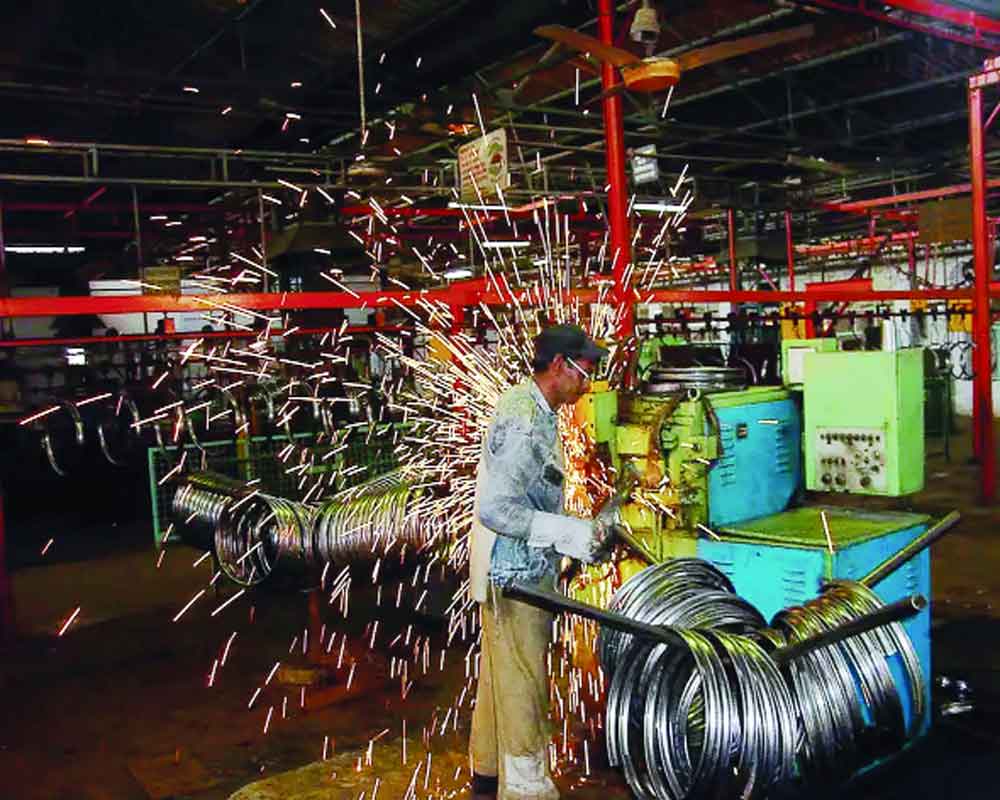Government action is needed to enhance global competitiveness and credit access for MSMEs. Schemes like Merchant Credit Card can be helpful
The Micro, Small and Medium Enterprises (MSMEs) are critical to unlocking the potential of India envisioned under the 'Make In India' campaign. This sector not only serves the purpose of ‘Atma Nirbharta’ but also paves the way for overall production, employment generation, and untapped export opportunities. Despite being the bulwark of the Indian economy, the vulnerable MSME sector is troubled by its financial constraints, owing to constant working capital expenditure and inaccessibility to mainstream finance.
The Parliamentary Standing Committee on Finance, in its report titled 'Strengthening Credit Flows to the MSME Sector,' exposes the fact that less than 40% of MSMEs avail credit from formal financial systems, and therefore depend on costly and unreliable credit. The credit gap in the MSME sector is estimated to be around Rs 20-25 lakh crore, with an addressable credit demand of about Rs 37 lakh crore and an existing mainstream supply of only Rs 15 lakh crore.
The MSME sector consistently contributes around 30% share of India’s GDP, 45% to its manufacturing output, and 48% to exports, while generating employment for 11 crore people out of 6.34 crore MSMEs. Almost 99% of the MSMEs are represented by micro-enterprises, and less than 1% are categorized under small and medium segments. Despite the latest amendments, the institutional credit does not match the investment requirements of micro-enterprises, which are business entities with investments of up to Rs 1 crore and turnover of up to Rs 5 crore. It is high time that the government takes decisive action to strengthen and support the MSME sector.
Accessing capital remains one of the biggest challenges for micro and small enterprises that aspire to grow. In recognition of this, the RBI has designated MSMEs as a priority sector and directed banks to allocate 40% of the Adjusted Net Bank Credit (ANBC) to priority sectors, including MSMEs. The guidelines also require banks to allocate 7.5% of the ANBC to micro-enterprises. However, a study by the RBI has found that most banks do not go beyond 25% for MSME credit.
Consistent regulatory obligations have a compounding effect on firm growth. While both NSE and BSE have introduced dedicated exchanges for MSMEs, out of the 6.34 crore MSMEs in India, only 342 are listed on the BSE SME exchange. This is because firms still prefer to avoid the capital markets. Listed SMEs need to comply with SEBI, RBI, and Companies Act regulations, which can be a high regulatory burden and compliance cost. What is needed is an ecosystem for MSMEs to thrive with less regulatory compliance costs, lower funding costs and the ability to scale.
The government needs to implement steps to ensure not only the survival but also the growth of vital MSMEs in India to save critical livelihoods and generate employment. The Indian MSME sector sources 84% of its working capital requirements from informal financiers, sometimes even at a higher rate of interest. Formal lenders prioritize the quality, reliability, and continuity of their borrowers, whereas MSMEs assess their financial accessibility based on the parameters of need, availability, and speed of credit disbursal.
As a result, informal moneylenders exploit the difference between the expectations of formal lenders and MSMEs, which contributes to MSMEs' unwillingness towards formalization. The implementation of GST has been a measure to bring maximum enterprises under the formal umbrella. But even today, out of the 6.34 crore MSMEs in India, only about 1.1 crore are registered with the Goods and Services Tax regime. This lack of formalisation among MSMEs has resulted in their credit requirements being largely unmet due to limited availability and access to data.
The Parliamentary Standing Committee on Finance has recommended several measures that can help in the formalisation and growth of the MSME sector. One of the recommendations is to link PAN- Udyog Aadhaar-GST identification numbers to curb the informal sector. It also suggested that providing working capital to MSMEs based on GST invoices can boost formalisation, including GST registration of businesses.
MSMEs are facing trust issues from banks. Merely 10% of the loans disbursal are collateral-free, while 90 % are collateral-backed. As the committee also proposed creating a digital ecosystem and adopting an account aggregator framework to secure digital financial data and enable low-cost, instant digital lending to MSMEs. This can replace physical collateral with secure access to GST invoices. Furthermore, the committee recommended that lending to the MSME sector should shift to cash-flow-based lending. In this system, loan requirements are assessed based on actual revenue generation and repayment capacities, rather than physical assets as collateral.
The Way Forward: The MSME sector faces inherent complexities that cannot be overlooked. To make MSMEs globally competitive and improve credit access for them, the parliamentary finance committee recommended that the government should introduce a Merchant Credit Card (MCC) scheme for traders and a Vyapar Credit Card (VCC) for micro-units.
These schemes could be similar to the Kisan Credit Card scheme with interest subvention, which is still awaited. However, it is high time for the government to announce the scheme in the upcoming budget to facilitate institutional credit accessibility for the MSME sector and address the problematic areas that hinder financial accessibility in this sector.
(The Author is Vice-Chairman of Sonalika Group, Vice-Chairman of the Punjab Economic Policy and Planning Board and Chairman of ASSOCHAM Northern Region Development Council. Views expressed are personal)


























